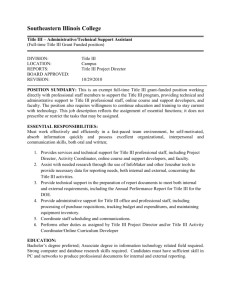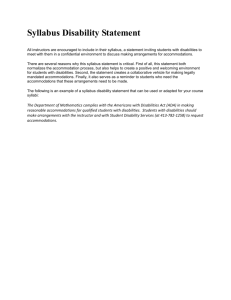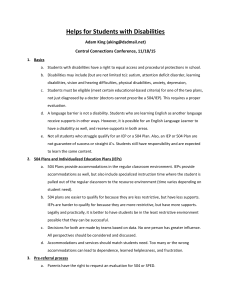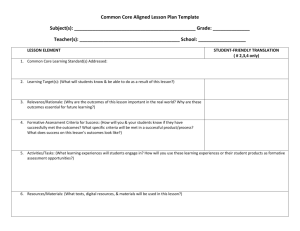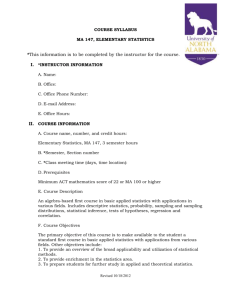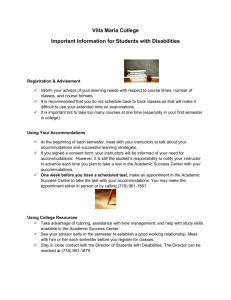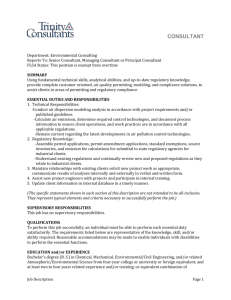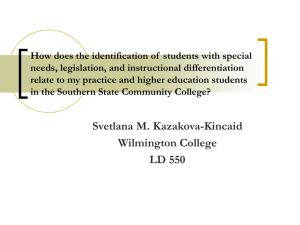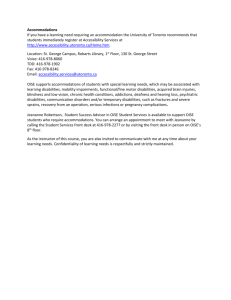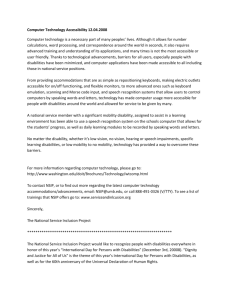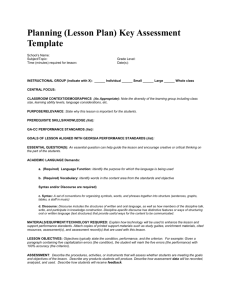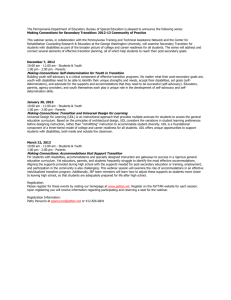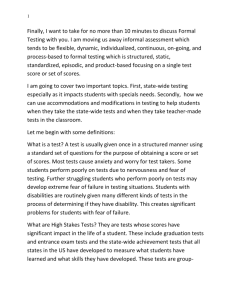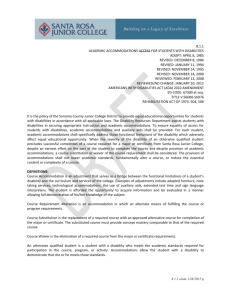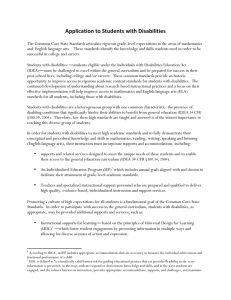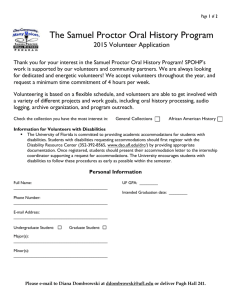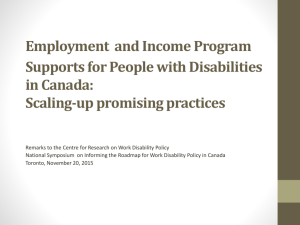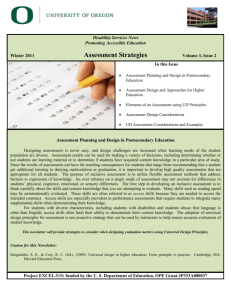Transitions: The Difference Between High School and College
advertisement
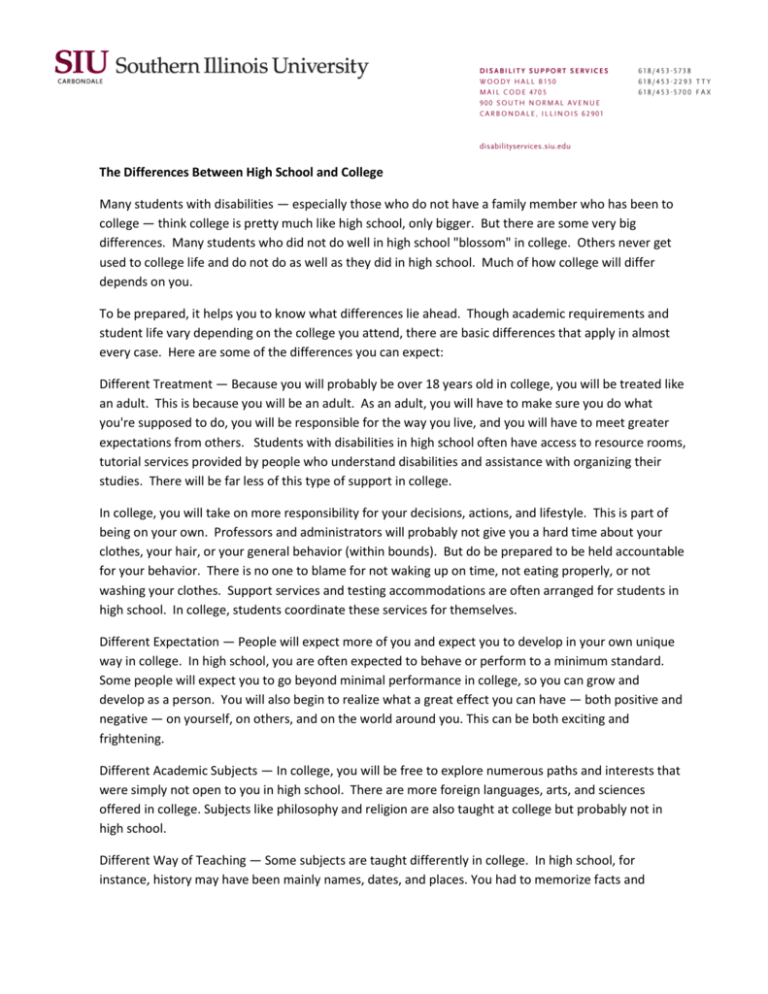
The Differences Between High School and College Many students with disabilities — especially those who do not have a family member who has been to college — think college is pretty much like high school, only bigger. But there are some very big differences. Many students who did not do well in high school "blossom" in college. Others never get used to college life and do not do as well as they did in high school. Much of how college will differ depends on you. To be prepared, it helps you to know what differences lie ahead. Though academic requirements and student life vary depending on the college you attend, there are basic differences that apply in almost every case. Here are some of the differences you can expect: Different Treatment — Because you will probably be over 18 years old in college, you will be treated like an adult. This is because you will be an adult. As an adult, you will have to make sure you do what you're supposed to do, you will be responsible for the way you live, and you will have to meet greater expectations from others. Students with disabilities in high school often have access to resource rooms, tutorial services provided by people who understand disabilities and assistance with organizing their studies. There will be far less of this type of support in college. In college, you will take on more responsibility for your decisions, actions, and lifestyle. This is part of being on your own. Professors and administrators will probably not give you a hard time about your clothes, your hair, or your general behavior (within bounds). But do be prepared to be held accountable for your behavior. There is no one to blame for not waking up on time, not eating properly, or not washing your clothes. Support services and testing accommodations are often arranged for students in high school. In college, students coordinate these services for themselves. Different Expectation — People will expect more of you and expect you to develop in your own unique way in college. In high school, you are often expected to behave or perform to a minimum standard. Some people will expect you to go beyond minimal performance in college, so you can grow and develop as a person. You will also begin to realize what a great effect you can have — both positive and negative — on yourself, on others, and on the world around you. This can be both exciting and frightening. Different Academic Subjects — In college, you will be free to explore numerous paths and interests that were simply not open to you in high school. There are more foreign languages, arts, and sciences offered in college. Subjects like philosophy and religion are also taught at college but probably not in high school. Different Way of Teaching — Some subjects are taught differently in college. In high school, for instance, history may have been mainly names, dates, and places. You had to memorize facts and figures. In college, those facts are not nearly as important as why certain events and actions happened. In college English, less time may be spent on grammar and spelling (it is assumed you have mastered these) and more on writing creatively and criticizing literature. If you major in one of the sciences, you will find that in your junior and senior years, you may be designing your own experiments rather than doing exactly what everyone else in your class is doing. In foreign languages, you will be reading literature in its original language rather than just repeating phrases. And you may be able to work and study in another country for a semester or year. Be open to falling in love with a subject in college that you may have disliked in high school. Two-thirds of college students graduate with a different major than the one they had in mind when they started often because they found an old subject taught in a new and more interesting way. Different Way of Learning — Many classes will be organized differently from the traditional high school lecture class. Some will be big lecture classes followed by small discussion groups. Some professor will have you read books, write papers, and discuss both in class. You may even have the chance to read independently with a professor or design your own research projects. Grading will be different, too. In some classes, you will have nothing but essay tests. In others, your entire grade will be determined by a single large paper or project. You may even have classes in which a group project is the primary grade. Different Level of Competition — In high school, you are often graded on whether or not you learn certain things. For example, there are standardized tests given to show that you have achieved a minimum level in certain subjects. In college, you are often graded "on the curve," your grade is determined more by how well you did in relation to your classmates than on a minimum knowledge base. This means there is more one-on-one competition between students. For example, receiving an 85 percent on a test in high school may have automatically been a B. In college, if most people did better than that, it could be a C or C-. High schools sometimes provide students with disabilities accommodations such as memory aids, open book or note tests, and lists of material that will be on tests. These types of accommodations are rare in college. Different Day to Day — High school is a place you go to seven or eight hours a day, less than half the days of the year. Many colleges are set up to be your home - you will eat and sleep there, spend time off there, make new friends there, even do your laundry there. Therefore, chances are good that college will have an even greater effect on you than high school did. In fact, it will be a time in your life like no other.

